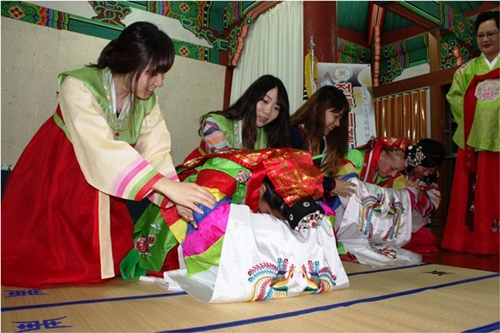‘All Eyes on Korea’ through Korean Lenses
What Makes Culture?
‘All Eyes on Korea’ through Korean Lenses

By Rigoberto Banta Jr., Head Student Editor
What comes to our mind when we think about Korean culture? Most of us will think about people in hanbok, the traditional Korean clothes, and to some maybe a wonderful tea ceremony in the late afternoon. What is culture? We have considered that culture is everything around us. Culture is the shared patterns of behaviour and interaction, learned by people through socialization. And thus, may it be traditional or popular, the interactions with different people makes the defining characteristics of a culture. But what if we forget our past and focus only on the present? The recent rise of K-pop gives us an opportunity to rethink culture and the proper way of looking at it.
K-Pop’s Effect: A Double-edged Sword?
Flashy clothes, cool moves and up-beat music, all of the above characterize the Korean popular music scene more commonly known as K-pop to the younger generation. K-pop has rapidly spread across Asia and around the world. We have seen different groups, songs and trends come and go but the steady increase of an international audience and the effective marketing strategy of entertainment companies have sent the message across that: K-pop is here to stay. Korean society has benefited quite largely through K-pop ranging from merchandise sales, tourism boom and of course promotional leverage done by people who are deeply involved in this trend. As a result of its high marginal returns, the Korean government itself has been at the forefront of strengthening K-pop as an asset to Korea in the international limelight.
On the other hand, we see more and more young Koreans leaving their cultural roots behind and setting expertise on foreign-related things as a standard of achievement. Foreign language scores have been one of the major areas of focus especially during the employment process and thus encouraging more young people to leave their own cultural traditions behind and looking into a wider perspective, not only of Korea but of the world. This brought forward a new culture, a popular culture amongst young Koreans with the use of a broken language and a distinctive waning of interest towards their traditional culture. One product of this is the broken Korean-English lyrics of K-pop songs and a highly Westernized popular culture scene in the country. Does K-pop mislead its fans into thinking that Korean culture is shared with the world? Are we sending the right message across?

Gangnam Style Craze Grasps the Attention of the World
Gangnam Style’s popularity has been confirmed: Psy has created a worldwide trend that made us look back again to K-pop and to the Korean Wave. From Rain to the Wonder Girls, we have only heard one side of the story here in South Korea where our home-grown idols have become one of the world’s top sensations. While we can only speculate for the previous attempts, Psy has definitely attracted the world’s attention and he did not even try. “I think that the special factor of Gangnam Style is that it did not even try to be famous. Psy’s upbeat music and easy-to-follow dance moves show us the commonality between different cultures” says Choi Ji-hyun (Junior, Department of English Language and Literature). On the other hand, Marina Tognoli (Junior, Department of English Language and Literature) from Brazil thinks that Psy’s Gangnam Style “misinterprets Korean culture and brainwashes people’s minds about Korea.” She thinks that people might tend to think differently about Korea and the craze on this popular song may be detrimental for the image of Korea to the world.
May it be proper or not, it is a carrier that led information about Korea to the acknowledgement of a bigger worldwide audience—and the Korean government’s stance towards attracting more attention to the country has been aggressive seeing it as an opportunity for not only expansion but also development to naturally let the flow of information about traditional Korean culture in. Launched in the first part of this year, the Development of Korean Culture and Arts on the Global Stage Project is the first step to infuse more information about Korea abroad and showcase a wider perspective rather than just popular culture through K-pop. The Korean government is expecting to have more cultural exchanges between countries in the future to create cultural leaders who shall promote not only Korean culture but understanding between countries. This long-term project shall be the engine for the soft power of Korea. What do international students at Chonnam National University (CNU) think about Korean culture?
Korea in the Eyes of International Students
Feyza Arslan and Hilal Ondogan, both exchange students from Erciyes University and Turkey are currently studying Korean Language and Literature, shared their opinions that Korea’s traditional culture is far more attractive than popular culture. “Of course many people are attracted to popular culture. Like them, I myself have come to know of Korea because of the dramas that I used to watch” says Feyza. She continues by adding that “learning another culture does not necessarily mean that one will leave one’s culture behind, it may even intensify the passion of someone to embrace his culture.” With more and more students like Feyza and Hilal coming to Korea and learning its ways, it proves the intrinsic value of Korean culture and it should set an example for the younger Korean generation to appreciate it more.
Karla Ivcek, an exchange student from Zagreb Univerity, Croatia, on the other hand, thinks that culture is integral to lifestyle and should be used as a tool to unite different people and not serve the purpose of only one. Karla is an expert in Taekwondo and has been learning this traditional Korean martial art for 14 years. She personally did not know about Korea before and slowly began to be influenced with the culture as she learned the ancient martial art. “Koreans should be proud of their long history” says Karla. At the same time, she adds that Koreans should never stop learning about foreign cultures and should never leave their own culture behind.
The influx of foreigners to Korea makes one consider how we should look at our own culture—and perhaps to appreciate it more than ever.
K-Pop: Tip of the Iceberg
“The perfect balance is the mix of old and new, traditional and popular culture” says Song Jun, a lecturer of Korean Culture at the Institute of Liberal Education, CNU. “Culture should always develop, and thus the presence of popular culture is inevitable. However, we should always remember to look back into traditional culture.” Similarly, Minister Choi Kwang-shik of the Ministry of Culture, Sports and Tourism, believes that the Korean government and its people should be in full-force to fully administer the “New Korean Wave” which will feature Korean traditional culture mixed with new popular culture. This balance, he says, will help provide sustainability of the Korean Wave and will inform the world that “Korea is not just an emerging economy, but a nation of rich tradition and history.” Korea’s cultural strength will be necessary to forward the nation as a developed country.
Rigoberto Banta Jr. 기자
tribune@cnumedia.com

